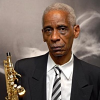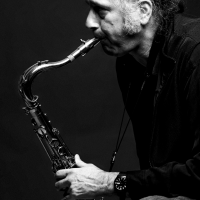Home » Jazz Musicians » Pharoah Sanders
Pharoah Sanders

Pharoah Sanders possesses one of the most distinctive tenor saxophone sounds in jazz. Harmonically rich and heavy with overtones, Sanders’ sound can be as raw and abrasive as it is possible for a saxophonist to produce. Yet, Sanders is highly regarded to the point of reverence by a great many jazz fans. Although he made his name with expressionistic, nearly anarchic free jazz in John Coltrane’s late ensembles of the mid-’60s, Sanders’ later music is guided by more graceful concerns.
The hallmarks of Sanders’ playing at that time were naked aggression and unrestrained passion. In the years after Coltrane’s death, however, Sanders explored other, somewhat gentler and perhaps more cerebral avenues — without, it should be added, sacrificing any of the intensity that defined his work as an apprentice to Coltrane.
Pharoah Sanders (his given name, Ferrell Sanders) was born into a musical family. Sanders’ early favorites included Harold Land, James Moody, Sonny Rollins, Charlie Parker, and John Coltrane. Known in the San Francisco Bay Area as “Little Rock,” Sanders soon began playing bebop, rhythm & blues, and free jazz with many of the region’s finest musicians, including fellow saxophonists Dewey Redman and Sonny Simmons, as well as pianist Ed Kelly and drummer Smiley Winters. In 1961, Sanders moved to New York, where he struggled. Unable to make a living with his music, Sanders took to pawning his horn, working non-musical jobs, and sometimes sleeping on the subway. During this period he played with a number of free jazz luminaries, including Sun Ra, Don Cherry, and Billy Higgins.
In 1964, Coltrane asked Sanders to sit in with his band. The following year, Sanders was playing regularly with the Coltrane group. Coltrane’s ensembles with Sanders were some of the most controversial in the history of jazz. Their music represents a near total desertion of traditional jazz concepts, like swing and functional harmony, in favor of a teeming, irregularly structured, organic mixture of sound for sound’s sake. Strength was a necessity in that band, and as Coltrane realized, Sanders had it in abundance.
Sanders made his first record as a leader in 1964. After John Coltrane’s death in 1967, Sanders worked briefly with his widow, Alice Coltrane. From the late ’60s, he worked primarily as a leader of his own ensembles.
In the decades after his first recordings with Coltrane, Sanders developed into a more well-rounded artist, capable of playing convincingly in a variety of contexts, from free to mainstream.
Read moreTags
Alice Coltrane: The Carnegie Hall Concert

by Mike Jurkovic
The most perfect of time machines, with no errant destinations and no abrupt landings, The Carnegie Hall Concert transports one to a time when artists took their art seriously, when it was sacrosanct. Alice Coltrane's harp comes on like the siren lure of angels, like a missionary, calling all to stop their labor. It seems to say, “Come to listen, come to wonder, come to rest, don't be afraid." And Coltrane wasn't, not ever. Here she was with ...
Continue ReadingPharoah Sanders: Upper Egypt & Lower Egypt

by Chris May
This little beauty, all sixteen minutes of it, is the opening track of Pharoah Sanders' first own-name masterpiece, Tauhid (Impulse!), recorded in 1966, released in 1967, and the blueprint for Sanders' style of astral jazz. Remarkably, many jazz enthusiasts, including Sanders fans, seem not to have heard Tauhid--and one leading tenor saxophonist on London's alternative jazz scene had never even heard of the album until it was brought to their attention in an interview a couple of years ago. Sanders ...
Continue ReadingOn Minimalism: Documenting A Musical Movement

by Ian Patterson
On Minimalism: Documenting A Musical Movement Kerry O'Brien and William Robin 449 Pages ISBN: 9780520382084 University of California Press 2023 Much like jazz, the origin story of minimalism is messy and hard to pin down to a date. And like jazz, definitions of minimalism can be rather slippery or downright contentious. Such challenges, thankfully, have not stopped editors Kerry O'Brien and William Robin from colourfully depicting a movement(s) in all its weird and ...
Continue ReadingPharoah Sanders: Pharoah (Box Set)

by Chris May
With the passing of Pharoah Sanders in September 2022, almost a year ago at the time of writing, and bearing in mind advances in sound-restoration technology, we can anticipate a stream of previously unissued Sanders recordings being released in the years ahead. If this outstanding 2-CD / 2-LP box set is anything to go by, bring it on. Disc One is a straight reissue of Sanders' oft pirated 1977 album Pharoah (India Navigation), albeit with much improved ...
Continue ReadingPharoah Sanders Quartet: Live At Fabrik

by Chris May
One reason Pharoah Sanders was such a special artist was the prismatic nature of his music. When Sanders lit on to a new avenue of investigation, he did not in the process reject what he had been doing up until that moment. Instead, he wove the new perspective into the existing structure, enriching rather than replacing it. The result was a rainbow in which the joins between what might have been, in lesser hands, incompatible instead became inaudible, and the ...
Continue ReadingPharoah Sanders, Cristiano Calcagnile & Sea Jun Kwon

by Maurice Hogue
The first two of hours of this episode of One Man's Jazz feature music from a number of excellent new releases, including two from Italy featuring drummer Cristiano Calcagnile's Anokhi and pianist Federico Nuti, a pair from Germany in trombonist Andreas Schickentanz & guitarist Jonas Hemmersbach, bassist Sea Jun Kwon & the Walking Cliche Sextet, Zoh Amba's Bhakti , the Blue Reality Quartet, and French drummer Florian Chaigne. The final hour is filled with music featuring the magnificent and eternal ...
Continue ReadingMy Conversation with Pharoah Sanders

by AAJ Staff
From the 1995-2003 archive: This article first appeared at All About Jazz in February 1999. When I first heard “The Father And The Son And The Holy Ghost" off of John Coltrane's Meditations, I was floored. I got the same reaction when I first heard Maria Callas sing “Vissi d'arte" in Victor de Sabata's interpretation of Puccini's Tosca. Callas was simply better than everyone else. She was on a whole different level than we were and thus the ...
Continue ReadingPharoah Sanders (1940-2022)

Source:
JazzWax by Marc Myers
Pharoah Sanders, a tenor saxophonist who initially was associated with free-jazz players in the 1960s, including Ornette Coleman, Sun Ra, Don Cherry and John Coltrane, but who went on to record several critical pan-African spiritual albums under his own name before developing a softer, more romantic sound in the 1980s and beyond, died on September 23. He was 81. Born in Little Rock, Ark., Farrell Sanders changed his first name to Pharoah in the early 1960s at the urging of ...
read more
Pharoah Sanders: Promises

Source:
JazzWax by Marc Myers
Even when Pharoah Sanders plays up-tempo, he sounds as if he's playing a ballad. That's because the tenor saxophonist, known for his deeply spiritual approach, is always in a meditative state when creating. Sanders began playing jazz in 1961, when he moved to New York from Oakland, Calif. Born Farrell Sanders in Little Rock, Ark., he was urged in New York to use the name Pharoah instead of Ferrell by Sun Ra. Sanders followed the orchestra leader's advice and promptly ...
read more
Jazztopad Hosts Wadada Leo Smith, Pharoah Sanders And Mulatu Astatke, 13 - 23 November

Source:
All About Jazz
Jazztopad, the internationally renowned Polish jazz festival held in jny:Wroclaw, returns for its 11th edition from 13 – 23 November 2014. This year promises to be a tremendously exciting festival, with the usual mixture of jazz legends, up-and-coming talent, World Premieres, international showcases and much more besides. Trumpeter Nate Wooley gets the festival underway on the 13th with the premiere of his work Psalms from Hell, featuring the ever-adventurous soprano Megan Schubert and the Festival Cello Ensemble. The second half ...
read more
Pharoah Sanders - In the Beginning - 1963-1964 Four-CD Boxed Set Includes 2 Discs of Unreleased Music

Source:
Michael Bloom Media Relations
PHAROAH SANDERS: IN THE BEGINNING - 1963-1964 (ESP-4069) This four-CD set documents the first recordings of iconic tenor saxophonist Pharoah Sanders, prior to his well known association with John Coltrane. Beginning with two previously unreleased sessions with Ornette Coleman alumni Don Cherry and Paul Bley, followed by Pharoah's debut date as a leader for ESP-Disk' and concluding with the first issue ever of the complete the December 30 and 31, 1964 Sun Ra at Judson Hall concerts, Sanders' only known ...
read more
Pharoah Sanders - Village of the Pharaohs/Wisdom Through Music (Originally Released on Impulse, 1971-72, Re-Issued Verve, 2011)

Source:
Music and More by Tim Niland
Although saxophonist Pharoah Sanders made his reputation as a firebrand of “The New Thing" there was always a deeply spiritual and meditative side to his playing and that aspect of his music comes to the forefront on this recently re-issued “2-fer." “Village of the Pharaohs" is a three part suite, which is particularly interesting because Sanders is playing soprano saxophone rather than his usual tenor. The music is full of rumbling percussion and the introduction of the shakuhachi adds an ...
read more
Pharoah Sanders: Welcome to Love

Source:
JazzWax by Marc Myers
As an ice-cold rain fell yesterday in New York, I reached for Welcome to Love, a 1990 album by Pharoah Sanders that I hadn't heard in a few years. The Sphinx-like tenor saxophonist is best known for his spiritual and avant-garde jazz recordings of the 1960s and 1970s, most notably Karma, which includes the dazzling 32-minute-plus The Creator Has a Master Plan. But the album I pulled loose features a slightly different Sanders. On Welcome to Love, the saxophonist plays ...
read more
Kahil El'zabar's Ritual Trio Featuring Pharoah Sanders - Ooh Live (Bright Moments Records, 2008) ***a1/2

Source:
All About Jazz
Kahil El'Zabar's has this magical touch to turn all his music into a pure joy, full of playful spirituality, reverent and fun at the same time. And yes, he tends to repeat himself at times, but then what, who cares, the performances of his Ritual Trio or the Ethnic Heritage Ensemble are always great to excellent. What more can you want? This one is recorded live in 2000, with Ari Brown on piano (predominantly) and sax and the late Malachi ...
read more
Les Paul (Mon) Mingus Orch. (Tues) May 2-6 Kenny Garrett/Pharoah Sanders (Fri Late Nite) JD Allen (Sat Late Nite) Dave Berkman at the Iridium Jazz Club

Source:
Jim Eigo, Jazz Promo Services
IRIDIUM JAZZ CLUB 1650 BROADWAY (Corner of 51st) NEW YORK, NY 10023 RESERVATIONS: 212-582-2121 8:30 & 10:30PM, Fri. & Sat. 3rd Sets AT MIDNIGHT Note: Set Times for Les Paul Remain at 8 & 10PM EVERY MONDAY LES PAUL AND HIS TRIO JOHN COLIANNI- PIANO- LOU PALLO- GUITAR, NICKI PARROTT- BASS Note: Set Times for Les Paul Remain at 8 & 10PM MINGUS LEGACY EVERY TUESDAY ...
read more
Les Paul (Tonight)-Mingus Big Band (Tue.) Pharoah Sanders Qt (Oct. 5-9) at The Iridium Jazz Club

Source:
All About Jazz
October 3, 2005 To: Listings/Critics/Features From: JAZZ PROMO SERVICES Press Contact: JIM EIGO, [email protected] IRIDIUM JAZZ CLUB 1650 BROADWAY (Corner of 51st) NEW YORK, NY 10023 RESERVATIONS: 212-582-2121, www.iridiumjazzclub.com Sets at 8 & 10PM EVERY MONDAY LES PAUL AND HIS QUARTET EVERY TUESDAY THE MINGUS BIG BAND ED PALERMO BIG BAND PLAYS THE MUSIC OF FRANK ZAPPA September 28, November 2 and November 9 Every Sunday Starting at 11:00AM Gospel Brunch featuring BISHOP NATHANIEL TOWNSLEY, JR. AND THE GOSPEL JUBILEE ...
read more
Evidence Releases Three Long-Overdue Jazz Gems by Pharoah Sanders, John Hicks, and Sonny Fortune et al

Source:
All About Jazz























































.jpg)






_with_Skip_Mcdonald_(Right)_23_n.jpg)










